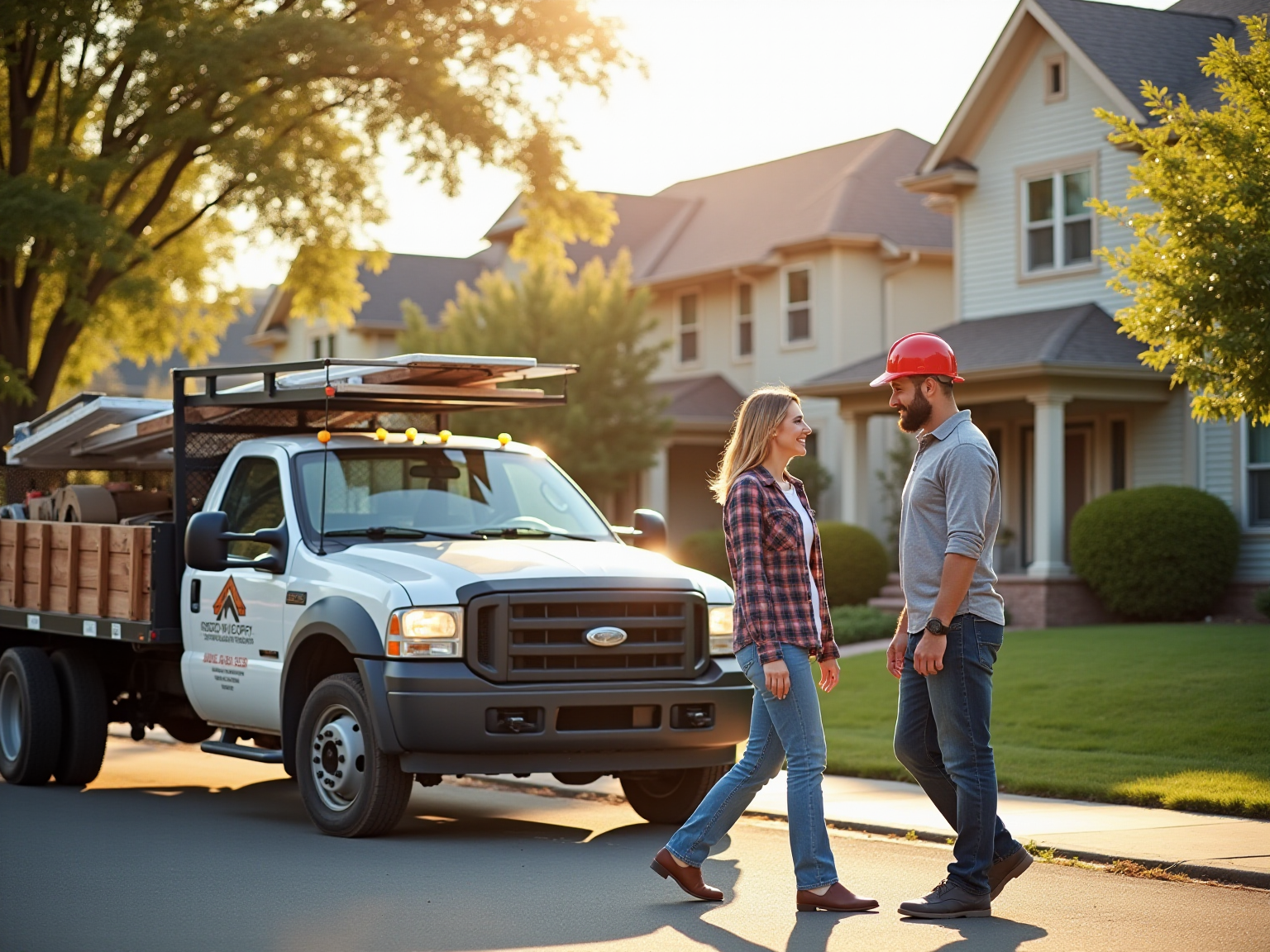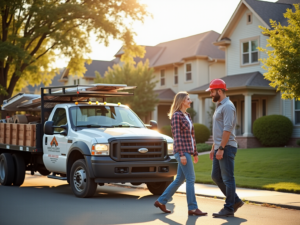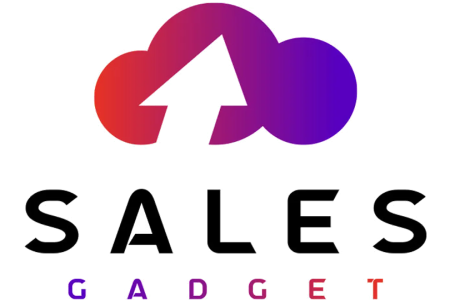Overview
This article delves into best practices for roofing companies leveraging Local Services Ads (LSAs) to enhance their marketing strategies effectively. LSAs significantly boost visibility and lead generation through targeted advertising, customer reviews, and a pay-per-lead model. These elements collectively foster trust and elevate conversion rates among homeowners in search of roofing services. By implementing LSAs, roofing companies can not only reach their target audience more efficiently but also build lasting relationships that translate into increased business opportunities.
Introduction
In the competitive world of roofing, distinguishing oneself to local homeowners is paramount for success. Local Services Ads (LSAs) present a compelling solution, enabling roofing companies to connect directly with potential clients actively seeking their services. By prominently positioning contractors at the top of search results, LSAs not only enhance visibility but also foster trust through customer ratings and reviews.
As consumer behavior continues to evolve, comprehending how to effectively leverage LSAs is essential for contractors aiming to increase their market share and drive conversions. This article explores the intricacies of LSAs, highlighting their benefits, best practices for implementation, and methods for integrating them into a comprehensive marketing strategy to ensure sustained growth in a rapidly changing landscape.
Understanding Local Services Ads (LSAs) for Roofing Companies
Local Services Ads represent a targeted advertising option from Google, specifically designed to elevate the visibility of roofing firms in local search results. Unlike conventional advertising methods, these services connect companies directly with homeowners actively seeking roofing solutions in their vicinity. When a property owner initiates a search for roofing options, local service ads prominently display relevant contractors at the top of the search results, often showcasing customer ratings and reviews that enhance credibility.
This strategic positioning is vital for contractors, as it positions them as trustworthy service providers within their local markets.
To participate in assessments, roofing companies must undergo a comprehensive vetting process that includes background checks and verification of licensing. This ensures that only reputable businesses are highlighted, fostering trust among potential customers. The effectiveness of local search advertisements is underscored by recent statistics indicating a significant shift in consumer behavior, with an increasing tendency for mobile searches and a growing reliance on customer reviews when selecting service providers.
Understanding customer behavior is essential for success in the home services industry. Kristen McCormick, Head of Marketing at Hatch, emphasizes the necessity of adapting to customer communication preferences.
As we look to 2025, the landscape of consumer behavior continues to transform, with home service businesses prioritizing operational efficiency and customer communication preferences. This trend underscores the importance of local service ads in bridging the gap between contractors and homeowners, ultimately resulting in enhanced conversion rates. Case studies reveal that businesses leveraging local service ads can achieve substantial improvements in phone call conversions by streamlining the calling process and personalizing the customer experience through conversation analytics.
For example, the case study titled “Driving Phone Call Conversions in Home Services” illustrates how marketers can refine their strategies by analyzing call data and integrating it with CRM systems.
As the sector adapts to these changes, the effective implementation of local service ads will be crucial for contractors aiming to refine their marketing strategies and capture a larger share of the market. With Sales Gadget’s innovative AI-powered lead generation solutions, such as the Neighborhood Takeover Strategy—which utilizes hyper-targeted video advertisements to cultivate trust in local markets—and Speed to Lead Technology that ensures leads receive responses within 15 seconds, firms in the roofing industry can bolster their organic leads and credibility. The discontinuation of the LSA Mobile application on January 6th, 2025, further emphasizes the need for construction businesses to enhance their online visibility through local service ads to remain competitive and effectively engage with prospective clients.
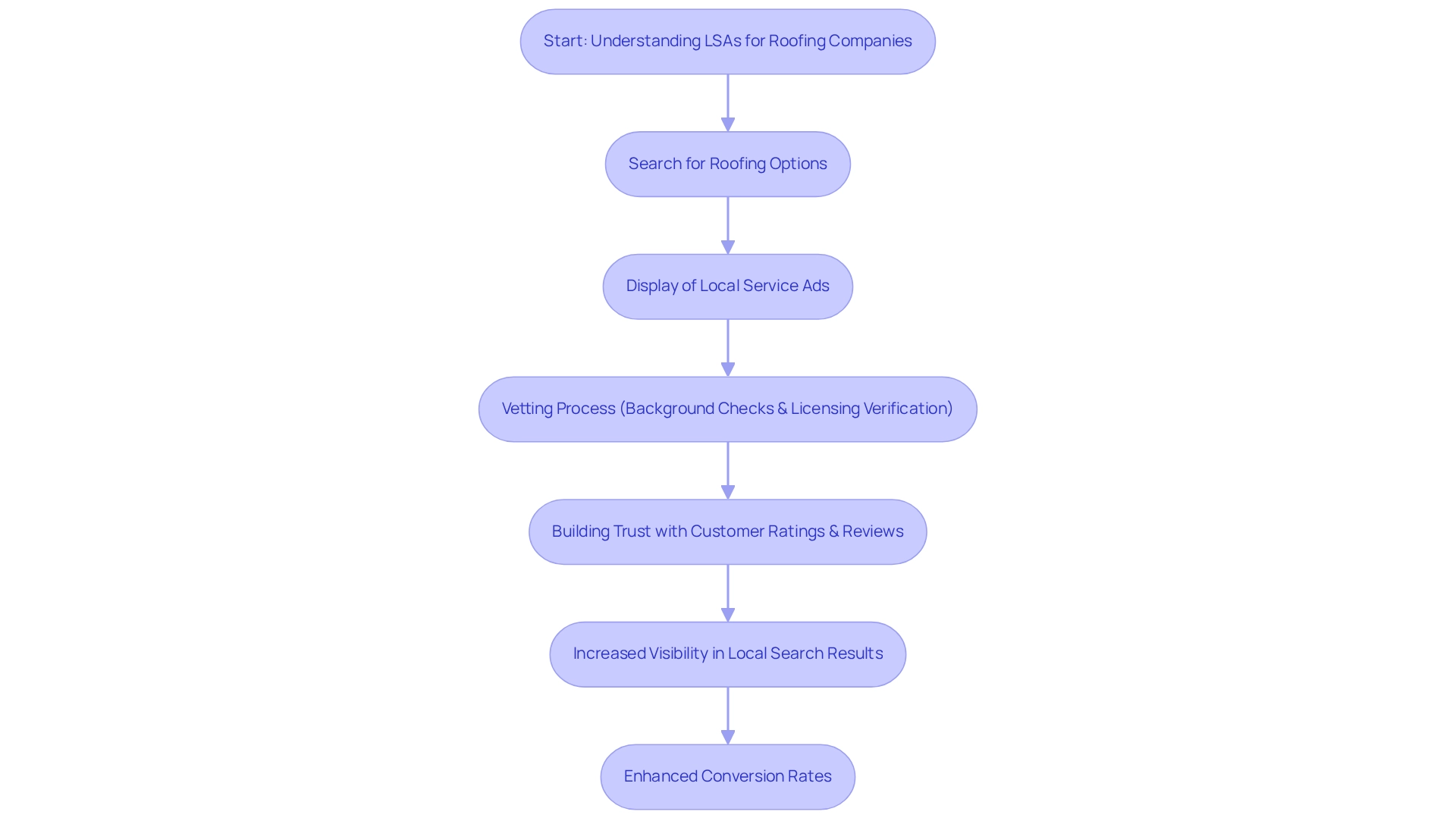
Benefits of Using LSAs in Roofing Marketing
Local Services Ads (LSAs) present a multitude of advantages for companies in the roofing sector, establishing them as an indispensable component of modern marketing strategies. Chief among these benefits is cost-efficiency; businesses incur expenses only for referrals that lead to direct customer inquiries, in contrast to traditional PPC campaigns that charge per click. This pay-per-lead model can yield significant savings, allowing contractors to allocate their marketing budgets with greater effectiveness.
Moreover, local service ads significantly enhance visibility by positioning roofing businesses at the forefront of search results, thereby increasing the likelihood of attracting prospective clients. Statistics reveal that businesses utilizing local service ads witness a pronounced improvement in visibility, with many reporting a substantial increase in inquiries and appointments. For instance, case studies from SalesGadget illustrate that companies leveraging local service ads have achieved visibility enhancements of up to 30% compared to those relying solely on conventional PPC methods.
Another critical aspect of local search ads is the integration of customer feedback and evaluations, which play a vital role in establishing trust and credibility. In the roofing industry, where homeowners often make considerable investments, positive feedback from previous clients can decisively influence their choice of contractor. SalesGadget’s AI-driven reputation management strategies facilitate the collection of 5-star reviews, thereby enhancing credibility and positioning businesses as trusted authorities in their field.
As Lori Swanson, Owner of Guardian Roofing, aptly states, “Having to wait until the end of the month to know your metrics is just not scalable. It’s really hard to grow that way. You find yourself really reactive.”
This trust is further bolstered by the transparency of local service agreements, enabling potential customers to view verified ratings and testimonials directly in their search results.
Additionally, SalesGadget’s AI-driven SEO strategies contribute to long-term growth by enhancing organic visibility and generating leads. As construction firms navigate a competitive landscape, the use of local service ads not only streamlines client acquisition but also fosters a reliable reputation that resonates with homeowners seeking trustworthy contractors for their home improvement projects. Furthermore, case studies from SalesGadget demonstrate that effective marketing strategies can deliver substantial returns on investment.
For example, one client achieved over $300,000 in revenue within just three months, underscoring the potential financial benefits of employing local service ads alongside SalesGadget’s innovative AI-driven lead generation solutions.
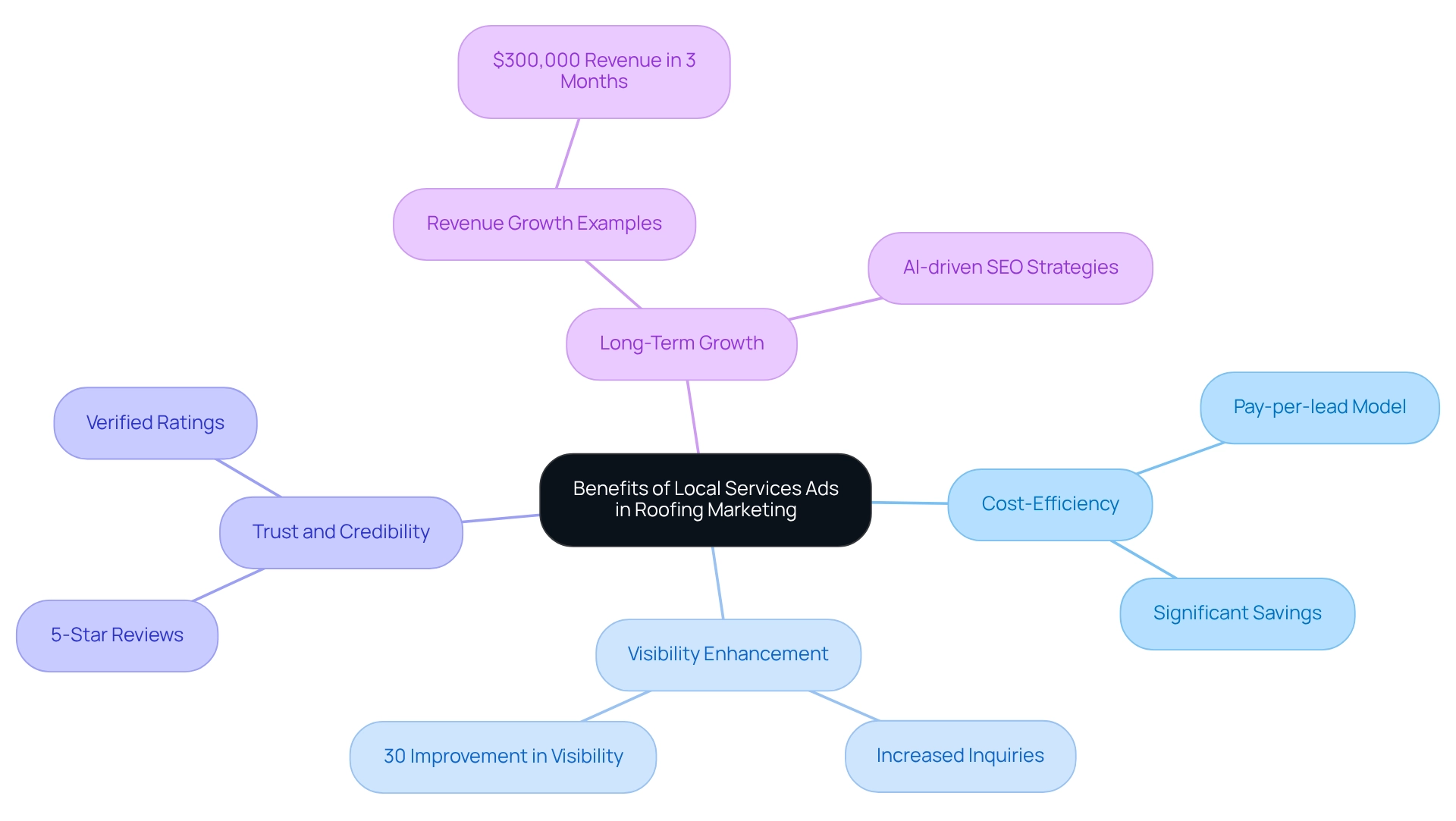
PPC vs. LSA: Choosing the Right Advertising Strategy for Your Roofing Business
When construction firms evaluate their advertising options, the choice between Pay-Per-Click (PPC) promotion and Local Services Ads (LSAs) becomes pivotal. PPC ads offer a wider reach and greater control over ad copy and targeting, making them suitable for businesses looking to attract a diverse customer base. However, this strategy requires ongoing management and can lead to substantial costs if not optimized effectively.
Conversely, local service ads are designed to connect with nearby clients actively seeking roofing services, providing a more focused and effective advertising approach. By removing the complexities of keyword management, local service ads streamline the advertising process, allowing contractors to concentrate on client acquisition rather than campaign intricacies.
In 2025, trends indicate that construction firms are increasingly leaning towards LSAs due to their ability to deliver high-quality leads with less effort. SalesGadget’s innovative approach, which merges AI-driven SEO with hyper-targeted advertising through its ‘Neighborhood Takeover Strategy,’ exemplifies this trend. This strategy utilizes personalized, relatable video advertisements that position local businesses as trusted experts.
Statistics show that nearly 95% of marketers believe AI enhances budget efficiency, highlighting the significance of integrating advanced technologies into advertising strategies. Furthermore, personalized customer interactions significantly impact business outcomes; 49% of customers feel valued when organizations tailor their communications, and 47% are more likely to engage with those businesses. This underscores the necessity for construction companies to implement strategies that prioritize personalized communication in their marketing efforts.
Expert insights suggest that while PPC can be effective, the straightforward and targeted nature of LSAs may offer a more beneficial path for roofing contractors. For instance, avoiding overly specific geographic targeting and unnecessary changes in Google Ads campaigns can lead to improved performance, as illustrated in the case study on common errors in Google Ads campaigns. This case study emphasizes the importance of effective account management and comprehension of bidding strategies to circumvent pitfalls that can undermine PPC efficacy.
Moreover, SalesGadget’s ‘Speed to Lead Technology’ ensures that every prospect is engaged within 15 seconds, maximizing the chances of conversion.
Ultimately, roofing companies must assess their specific goals and the nuances of their target audience when deciding between PPC and LSA advertising. As Frank articulated, “I’d like to keep working, keep growing. I want to increase efficiency, automate processes, and make our operations more streamlined.”
By understanding the strengths and limitations of each method, they can make informed decisions that align with their business objectives and enhance their client acquisition efforts, leveraging SalesGadget’s innovative solutions for sustainable growth.
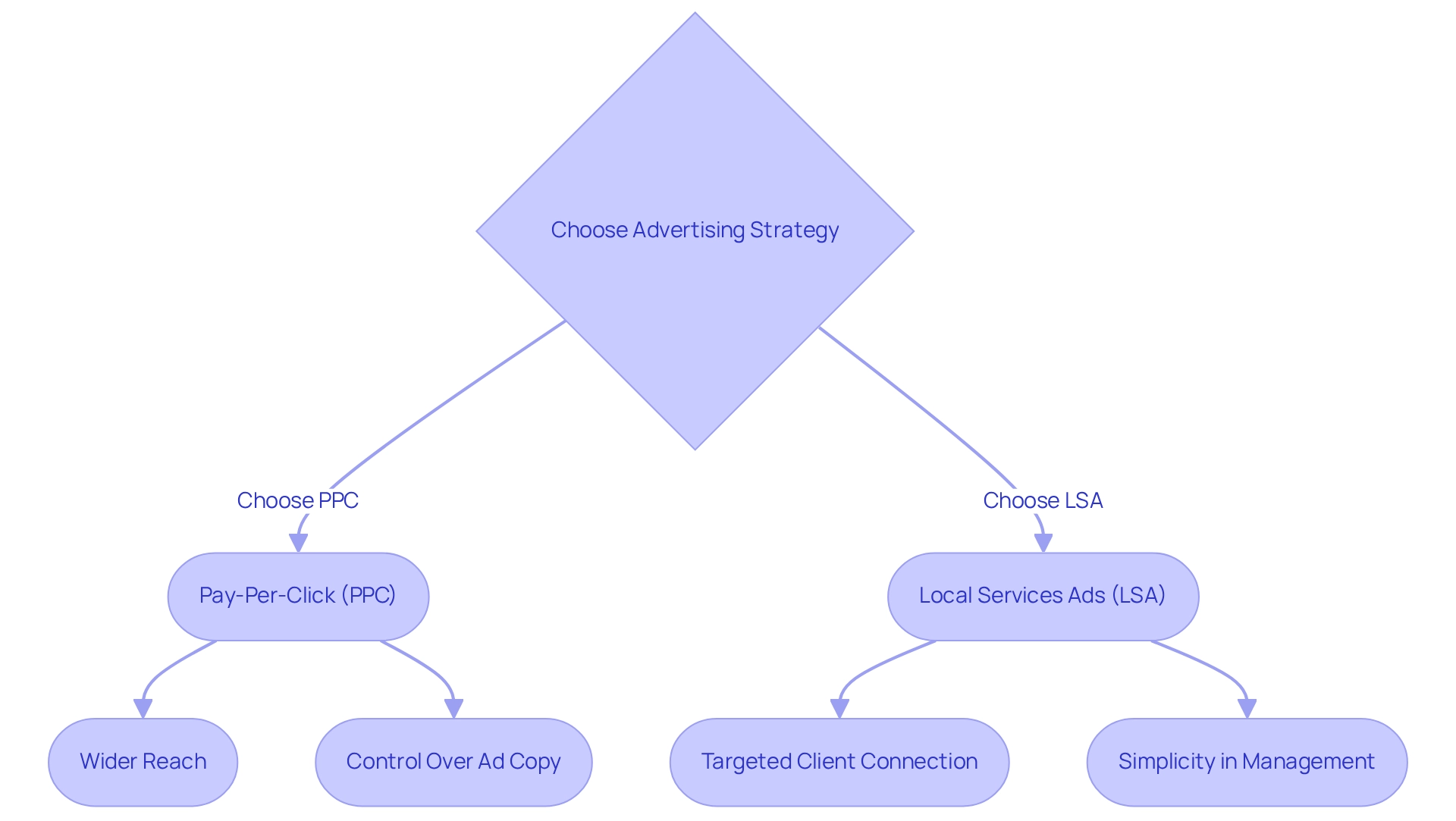
Setting Up and Optimizing Your LSA Campaigns
To effectively establish and enhance your Local Services Ads campaign, begin by confirming that your business meets Google’s eligibility requirements, including necessary licenses and insurance. Create a compelling business profile that clearly outlines your services and the areas you serve, while showcasing customer reviews. Utilizing high-quality images and detailed service descriptions is crucial for attracting potential customers.
Once your ads are live, consistently monitor their performance. Focus on essential metrics such as prospect quality and conversion rates, and be prepared to adjust your budget and targeting strategies accordingly. Engaging with customer reviews and responding promptly to inquiries not only boosts your ad’s visibility but also enhances its effectiveness, ultimately leading to higher conversion rates. SalesGadget’s automated follow-up system ensures that leads are engaged within 15 seconds, significantly increasing the chances of conversion.
In 2025, best practices for optimizing LSAs include refining your business categories and service descriptions to attract more relevant leads, thereby improving overall campaign efficiency. Leveraging call tracking can provide insights into how many calls each ad generates, allowing for data-driven adjustments to your strategy. As outlined in the operational mechanics of Google Service Ads, this pay-per-lead model guarantees that businesses only pay for legitimate inquiries, greatly enhancing return on investment (ROI) and reducing wasted ad budgets.
Furthermore, focusing on new homeowners is essential, as they are 400% more likely to require roofing-related services in their first year, according to digital marketer David Victor. By implementing these strategies, roofing contractors can significantly enhance their LSA marketing campaigns, ensuring they capture the attention of homeowners in need of roofing services. Additionally, incorporating AI-driven SEO tactics can assist in improving your Google rankings, offering a consistent stream of natural inquiries over time, while SalesGadget’s multi-channel marketing strategy ensures that your business remains visible across different platforms.
Do not overlook the significance of reputation management; positive reviews foster trust and can transform visitors into potential clients. Finally, utilizing third-party data can enhance your prospect generation strategies, ensuring you stay ahead of the competition.
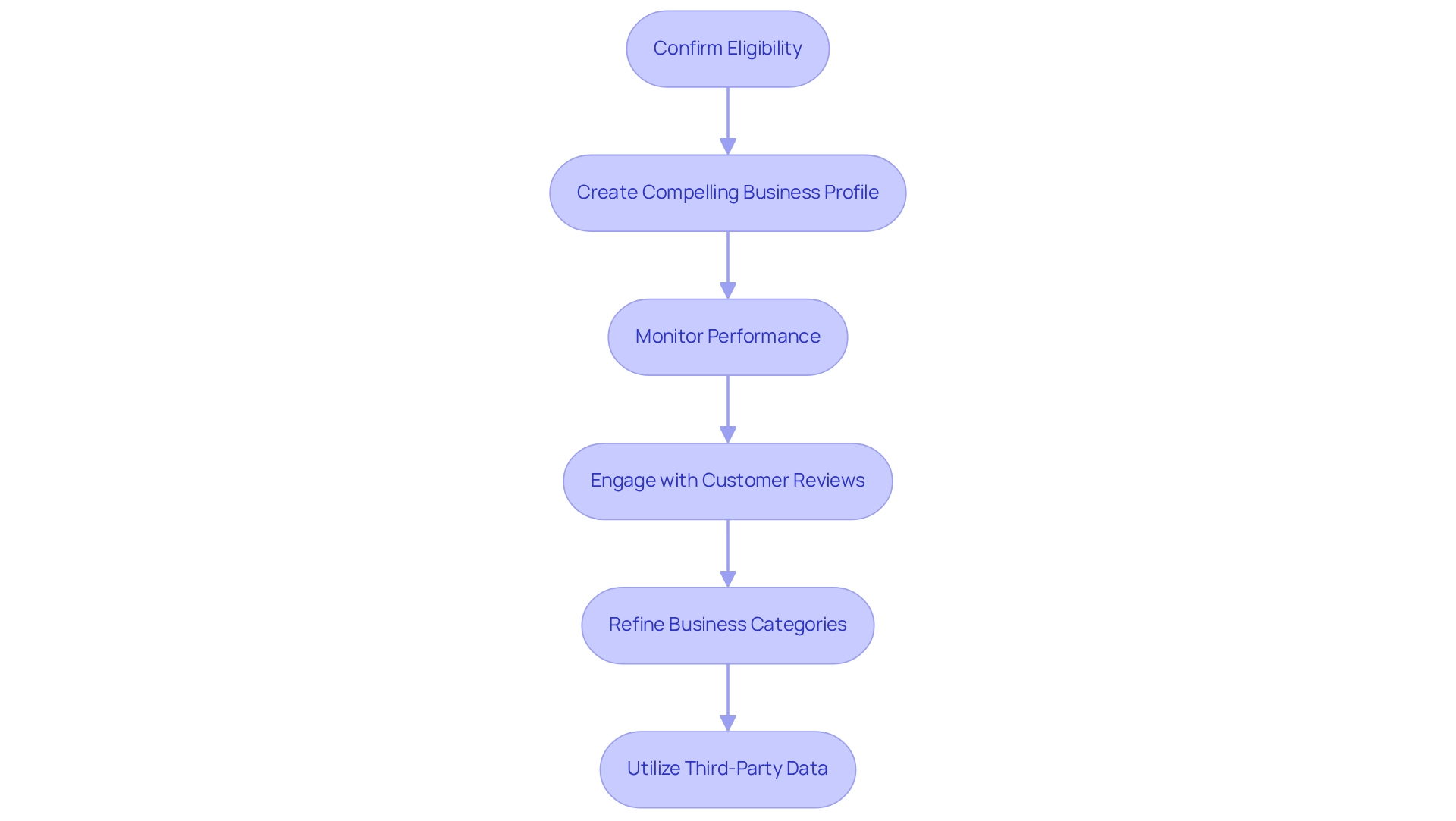
Leveraging Customer Reviews for LSA Success
Customer reviews serve as a vital resource for construction companies utilizing Local Services Ads (LSAs). Positive feedback not only increases your ad’s visibility but also cultivates trust among potential customers. To maximize the impact of reviews, it is essential to actively encourage satisfied clients to share their experiences on your LSA profile.
Engaging with reviews—both positive and negative—demonstrates a commitment to customer service, which can significantly influence prospective clients’ decisions. Moreover, prominently displaying high ratings in your ads can enhance your credibility and attract more leads. Implementing automated review requests following project completion can streamline the process, ensuring a consistent influx of positive feedback. This method not only aids in maintaining a robust online reputation but also aligns with the growing tendency of consumers to rely on online evaluations, with recent data indicating that 79% of consumers trust online reviews as much as personal recommendations.
As the construction job market is projected to expand by 6% from 2023 to 2033, competition will intensify, making effective review management increasingly essential. According to Jeff Bowab, vice president, optimizing your Local Service Ads involves selecting the appropriate service categories and managing your reviews efficiently. Additionally, insights from the 2025 Best of Success Conference underscore the importance of addressing industry challenges and advancements, reinforcing the need for businesses in the sector to strategically leverage customer feedback.
By prioritizing customer reviews, construction firms can significantly enhance their LSA success and drive more business in a competitive market. This is exemplified by SalesGadget’s demonstrated success, where one client secured over $300,000 in revenue within just three months, highlighting the financial benefits of effective review management and prospect generation strategies. Furthermore, utilizing AI-driven SEO and reputation management can greatly boost organic inquiries and credibility, establishing your business as a trusted authority in the sector.
As one satisfied client noted, ‘SalesGadget changed our strategy for prospect generation, and the outcomes are evident.’ This underscores the tangible impact of leveraging customer feedback and innovative strategies to achieve measurable success.
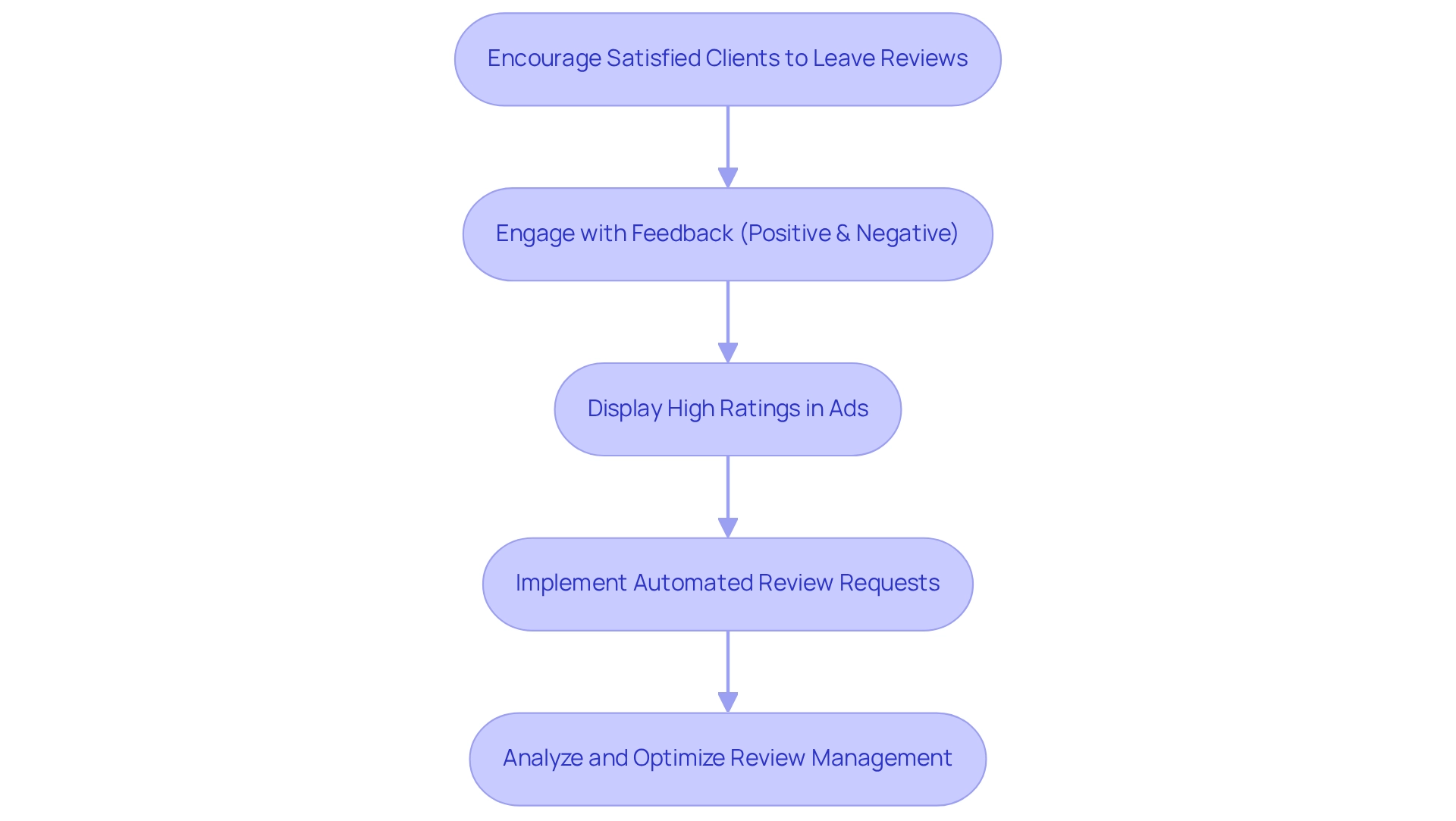
Integrating LSAs into Your Comprehensive Marketing Strategy
Incorporating local service ads (LSAs) into your overall marketing strategy is crucial for optimizing prospect generation in the construction sector. By merging LSAs with additional digital marketing strategies such as Search Engine Optimization (SEO) and Pay-Per-Click (PPC) advertising, construction firms can create a robust and efficient marketing approach. LSAs are particularly effective at generating prompt inquiries, with statistics indicating that responses can begin arriving within the first 24 hours after setting up advertisements, underscoring their swift impact.
Conversely, SEO efforts focus on establishing long-term visibility and brand awareness, ensuring that your business remains top-of-mind for homeowners seeking roofing services.
Consider SalesGadget’s innovative Neighborhood Takeover Strategy, which exemplifies how hyper-targeted video ads can position your brand as the trusted name in your community, driving both immediate and sustainable growth. When combined with AI-powered SEO, which establishes a strong online presence and automatically generates organic prospects, businesses in the roofing sector can achieve a balanced approach to client acquisition. Furthermore, leveraging social media platforms can further enhance your marketing strategy.
Engaging with your audience through targeted content and promotions not only increases brand awareness but also fosters customer loyalty. By developing a cohesive marketing strategy that employs multiple channels, enterprises in the roofing industry can significantly improve their reach and effectiveness. However, it’s essential to acknowledge the challenges posed by high costs per click (CPC) on platforms like Google Ads, where certain keywords can exceed $40, and costs per lead (CPL) often surpass $100.
This reality highlights the importance for construction businesses to understand their target audience and create impactful marketing strategies that resonate with prospective clients. The increasing advertising expenditure and the digital shift during the pandemic emphasize the critical need for home service providers to manage these challenges effectively.
As we approach 2025, trends in multi-channel marketing effectiveness suggest that roofing businesses, particularly family-owned ones, that successfully integrate LSA marketing with SEO and PPC strategies will experience ongoing growth. This comprehensive strategy not only drives customer acquisition but also enhances retention, positioning companies in the industry for sustained success in a competitive market. Moreover, as Cary Byrd, CEO of CinchLocal, emphasizes, roofing companies can benefit from a complimentary consultation to refine their marketing tactics and secure more prospects.
Additionally, partnering with a marketing agency like SalesGadget, which offers flexible month-to-month service agreements and a 100% satisfaction guarantee, can build trust and ensure a steady stream of high-quality leads.
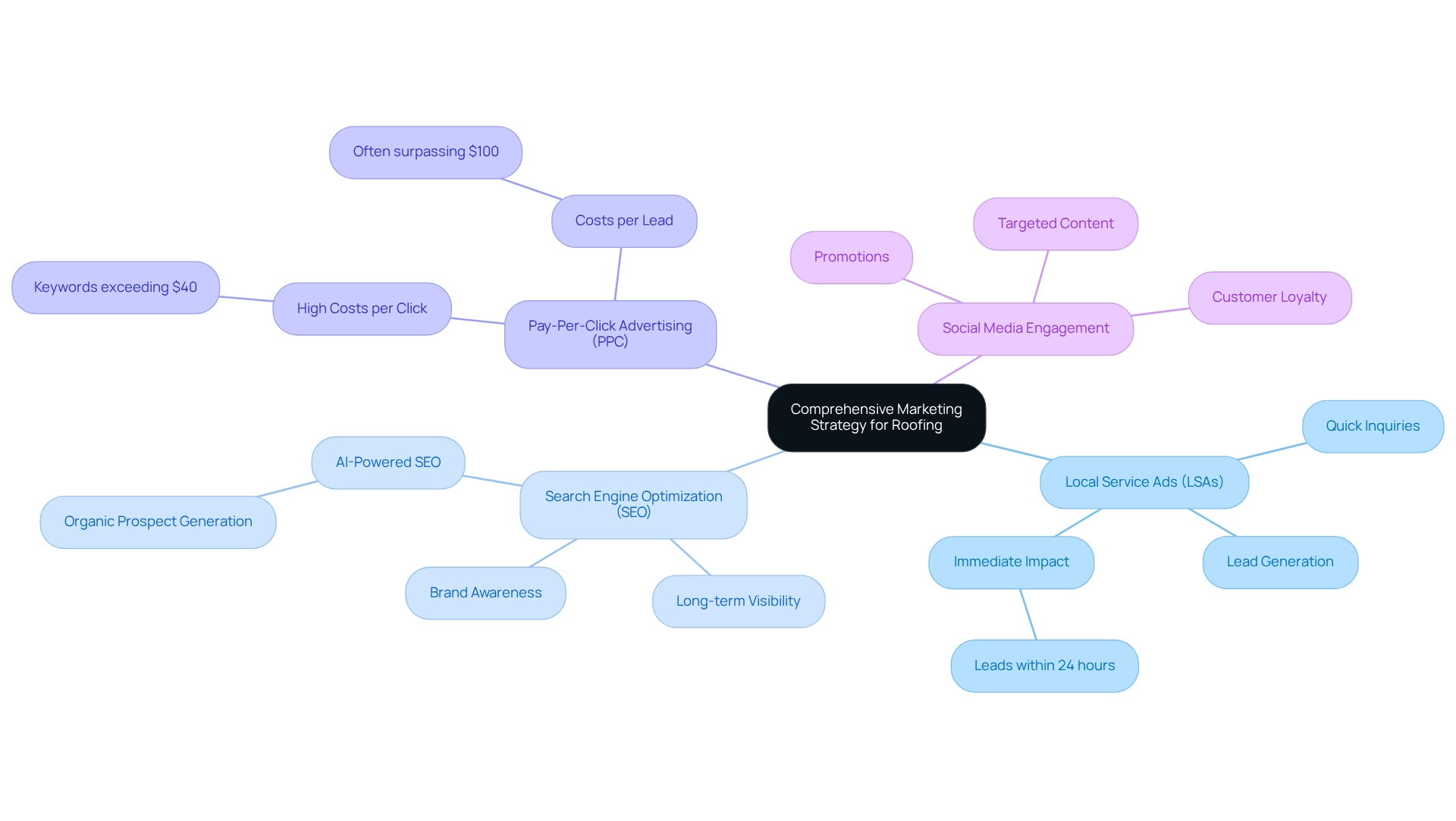
Overcoming Challenges in LSA Marketing for Roofing Companies
Roofing businesses frequently face various challenges when implementing LSA marketing. Key issues encompass managing customer expectations, addressing negative reviews, and ensuring compliance with Google’s stringent requirements. In 2025, customer expectations within the construction sector have evolved, with homeowners increasingly demanding transparency and responsiveness from contractors.
To effectively navigate these challenges, establishing clear communication with clients regarding the services offered and the anticipated outcomes is crucial. This proactive approach not only sets realistic expectations but also fosters trust.
Moreover, actively managing your online reputation is essential. Responding promptly to reviews—both positive and negative—can significantly impact potential customers’ perceptions.
SalesGadget employs automated review management systems that enhance your online reputation, ensuring homeowners choose you over competitors. For example, a construction firm that improved its website design and functionality experienced a notable increase in client conversion rates, underscoring the importance of a robust online presence. This aligns with case studies emphasizing that a well-crafted website is vital for converting visitors into clients.
Additionally, the benefits of energy-efficient solutions should not be overlooked. Reflective materials for roofs can reduce surface temperatures by as much as 50° Fahrenheit, appealing to homeowners seeking sustainable options.
Staying informed about Google’s policies and guidelines is another critical aspect of successful LSA implementation. Regularly reviewing campaign performance and making necessary adjustments can help mitigate challenges and enhance overall effectiveness. By addressing common pain points, such as slow conversion rates and ineffective LSA marketing efforts, roofing contractors can leverage LSA marketing to their advantage, ultimately driving more inquiries and sales.
SalesGadget’s innovative approach merges AI-driven SEO with highly focused advertising, guaranteeing that your marketing strategies are both efficient and sustainable.
As a timely prompt, roofers are encouraged to request a custom quote to potentially increase their inquiries and sales, highlighting the necessity of proactive measures in their marketing strategies. Furthermore, it is essential to be cautious of high-pressure sales techniques that may lead to long-term contracts contractors might regret, emphasizing the importance of clear communication with clients.
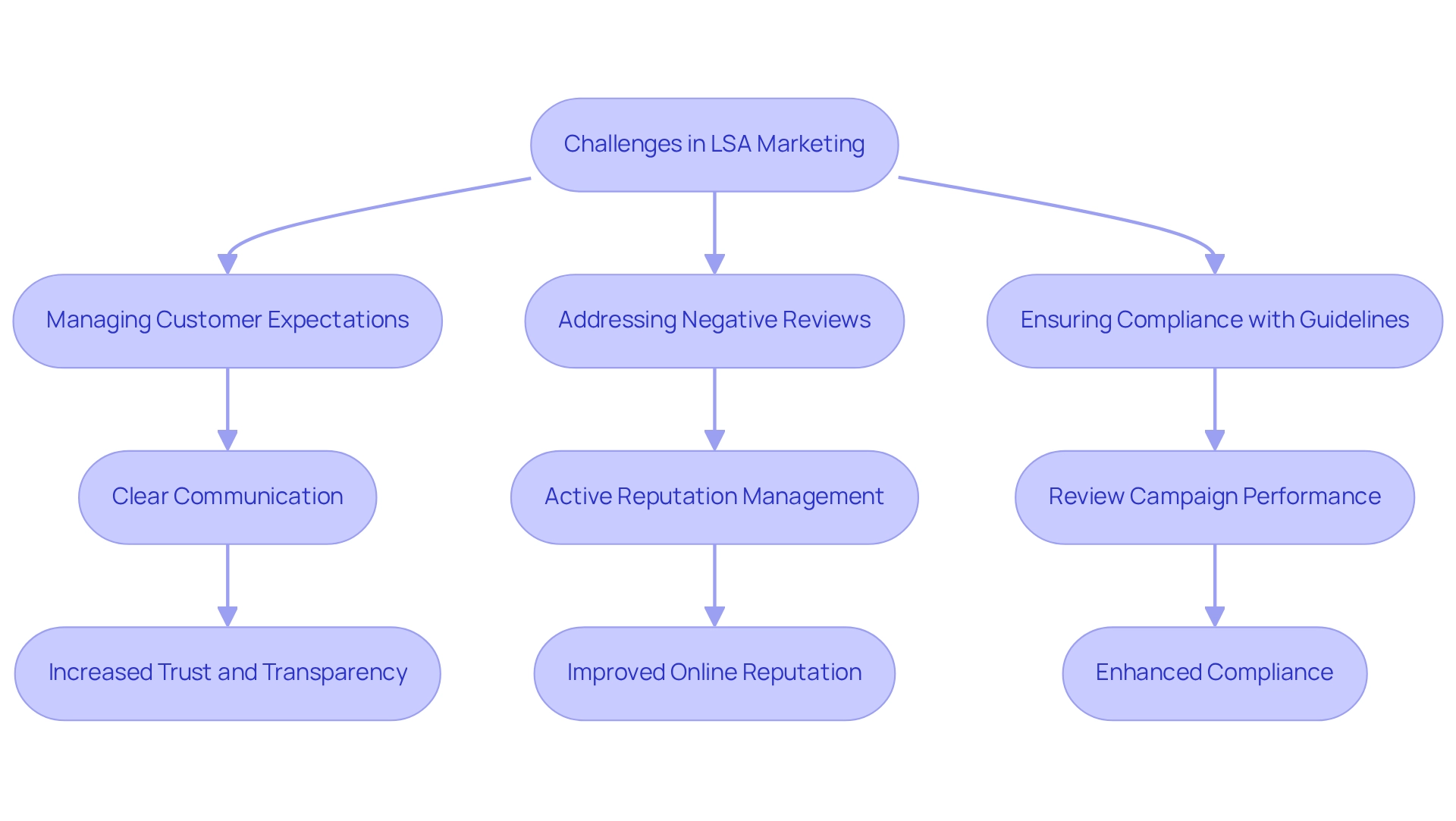
Measuring Success: Key Metrics for LSA Campaigns
To effectively assess the success of your Local Services Advertisements campaigns, it is essential to focus on several key performance metrics: inquiry volume, conversion rates, and cost per inquiry. Tracking the quantity of prospects generated from your local service ads offers important insight into their efficiency in attracting inquiries. For construction firms, a substantial inquiry volume signifies a strong market presence and the capacity to draw in potential clients actively searching for services related to roofs.
Conversion rates are also vital, as they show how many of those inquiries ultimately turn into paying customers. A high conversion rate indicates that your local service ads are not only drawing attention but also successfully engaging potential clients, which is essential for maximizing revenue. SalesGadget’s innovative method, featuring their AI-driven tools that react to inquiries in only 15 seconds, greatly improves engagement and conversion rates for contractors in the construction sector.
Cost per inquiry is another crucial metric that highlights the effectiveness of your advertising expenditure. By calculating the cost related to each prospect generated through LSAs, companies in the roofing industry can evaluate whether their marketing budget is being used efficiently. This metric enables a clearer comprehension of the return on investment (ROI) from your advertising efforts.
Regularly assessing these metrics empowers contractors to make informed, data-driven decisions that can optimize their campaigns. For example, if the volume of prospects is high but conversion rates are low, it may suggest a need to enhance your follow-up procedures or improve the quality of prospects being generated. Conversely, if both inquiry volume and conversion rates are robust, it indicates a successful campaign that can be expanded further.
In 2025, data reveals that construction firms employing local service ads have seen substantial growth in inquiry volume and conversion rates, highlighting the efficacy of this promotional strategy. Notably, SalesGadget has helped clients secure over $300,000 in revenue within just three months, demonstrating the potential success of LSAs in driving revenue. By diligently tracking these key metrics and leveraging SalesGadget’s unique 4-Pillar AI Framework, which combines hyper-targeted ads and AI-driven SEO, businesses in the construction industry can enhance their marketing strategies, ensuring sustained growth and profitability in a competitive landscape.
Additionally, SalesGadget utilizes third-party data from advertising platforms and social media channels to refine lead generation strategies, ensuring that campaigns are targeted and effective. The Neighborhood Takeover Strategy further positions roofing companies as trusted local experts, enhancing their visibility and engagement within their communities. This comprehensive approach not only drives immediate results but also fosters long-term relationships with potential clients.
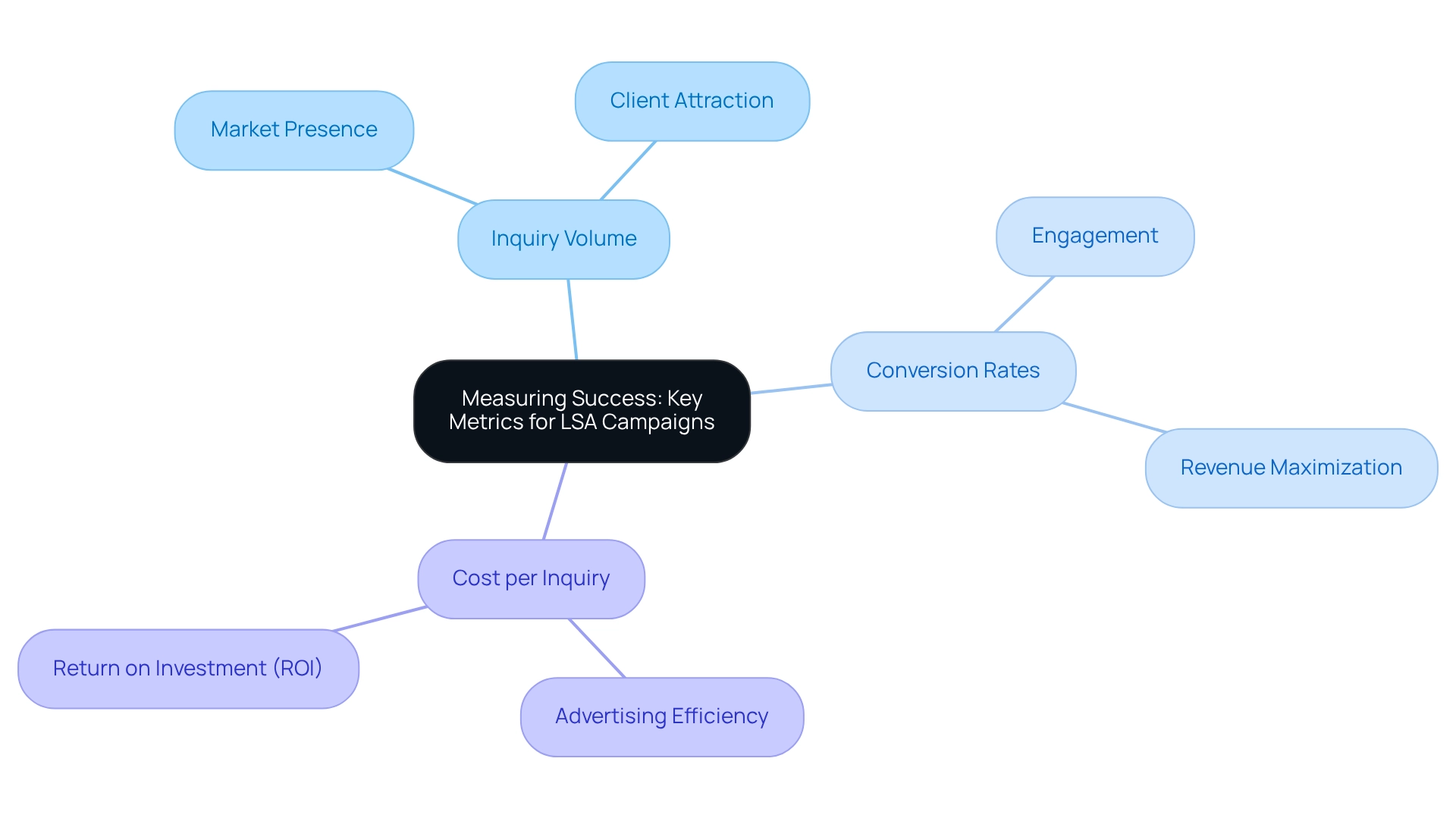
Conclusion
Local Services Ads (LSAs) have emerged as a transformative tool for roofing companies aiming to enhance visibility and connect with potential clients in a competitive landscape. By prioritizing customer engagement and leveraging verified ratings, LSAs streamline the lead generation process while building trust among homeowners. The pay-per-lead model associated with LSAs presents a cost-effective solution, enabling contractors to maximize their marketing budgets and focus on quality leads.
Integrating LSAs into a broader marketing strategy, alongside SEO and social media efforts, empowers roofing businesses to create a holistic approach to customer acquisition. This multifaceted strategy not only drives immediate inquiries but also fosters long-term brand loyalty and recognition. As the market continues to evolve, adapting to consumer preferences and optimizing advertising strategies will be crucial for sustained growth.
Ultimately, embracing LSAs and the accompanying best practices can significantly impact a roofing company’s success. By effectively managing customer reviews, monitoring key performance metrics, and utilizing innovative technologies, contractors position themselves as trusted authorities in their local markets. As the demand for roofing services grows, leveraging LSAs will be essential for contractors aiming to capture a larger share of the market and achieve lasting success.
Frequently Asked Questions
What are Local Services Ads (LSAs) and how do they benefit roofing firms?
Local Services Ads are a targeted advertising option from Google designed to increase the visibility of roofing firms in local search results. They connect companies directly with homeowners looking for roofing solutions, displaying contractors at the top of search results along with customer ratings and reviews, which enhances credibility.
How do Local Services Ads improve trust among potential customers?
Roofing companies must undergo a vetting process that includes background checks and licensing verification to participate in LSAs. This ensures that only reputable businesses are highlighted, fostering trust among potential customers.
What impact do Local Services Ads have on consumer behavior?
There is a significant shift in consumer behavior towards mobile searches and reliance on customer reviews. Local Services Ads help bridge the gap between contractors and homeowners, improving conversion rates by enhancing visibility and trust.
How can businesses measure the effectiveness of Local Services Ads?
Case studies show that businesses using LSAs can achieve substantial improvements in phone call conversions by analyzing call data and integrating it with CRM systems, leading to a more personalized customer experience.
What is the cost model associated with Local Services Ads?
LSAs operate on a pay-per-lead model, meaning businesses only incur expenses for referrals that result in direct customer inquiries, contrasting with traditional PPC campaigns that charge per click, leading to more efficient budget allocation.
How do customer reviews influence the effectiveness of Local Services Ads?
Positive customer feedback is crucial in the roofing industry, as it influences homeowners’ decisions. LSAs incorporate customer ratings and testimonials, enhancing trust and positioning businesses as credible authorities.
What are some long-term benefits of using Local Services Ads?
LSAs not only enhance visibility and lead generation but also foster a reliable reputation. They can significantly improve organic visibility and contribute to long-term growth for roofing firms.
What innovative solutions does Sales Gadget offer to enhance the effectiveness of Local Services Ads?
Sales Gadget provides AI-powered lead generation solutions, such as the Neighborhood Takeover Strategy for targeted video ads and Speed to Lead Technology, ensuring leads receive prompt responses, which can bolster organic leads and credibility.
What recent change emphasizes the importance of Local Services Ads for construction businesses?
The discontinuation of the LSA Mobile application on January 6th, 2025, highlights the need for construction businesses to enhance their online visibility through LSAs to remain competitive and effectively engage with prospective clients.
